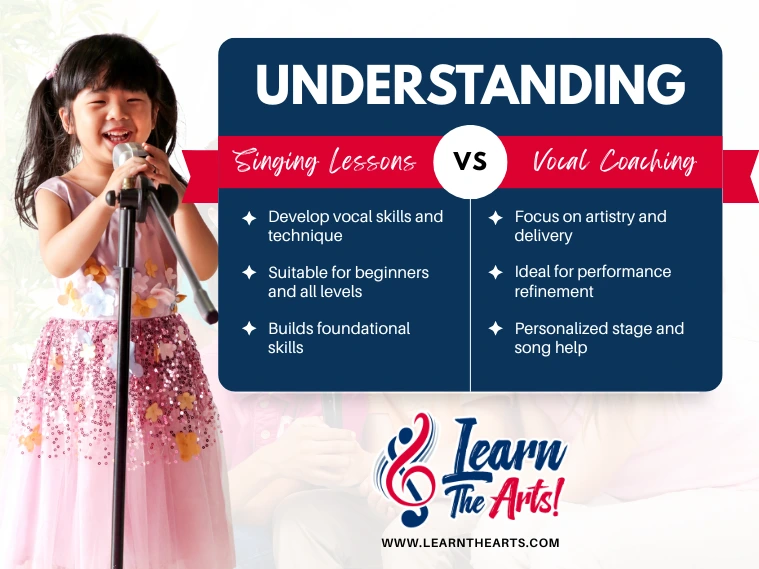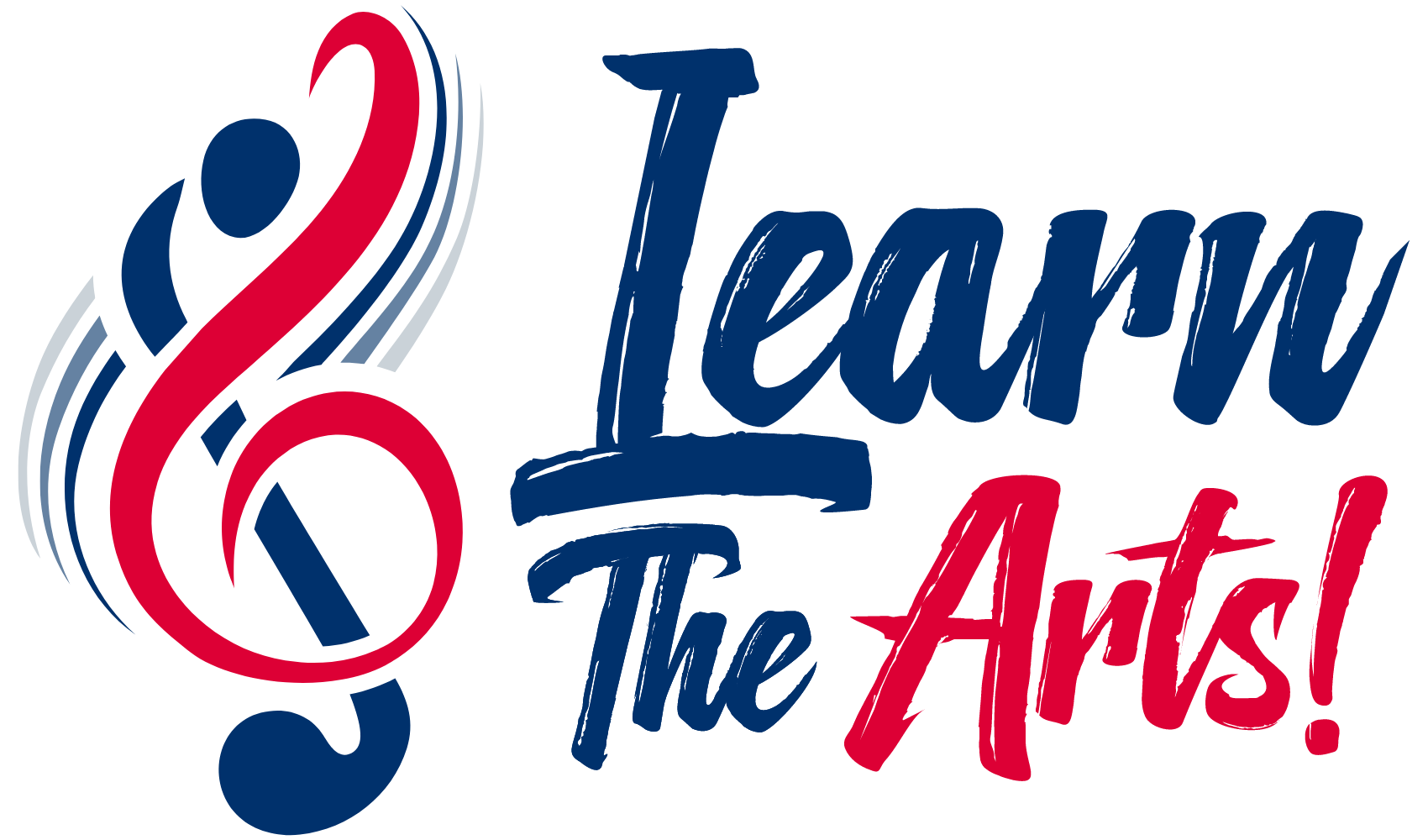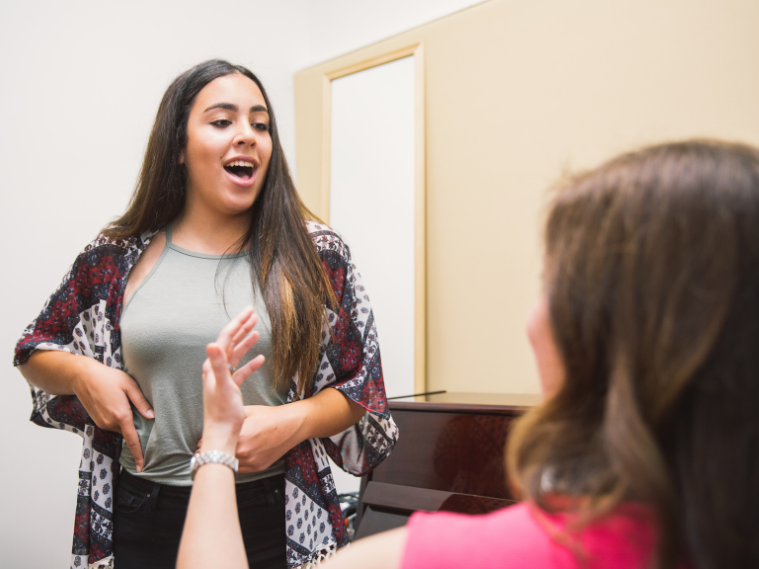Whether you’re preparing for auditions, performing in a band, or simply singing for joy, choosing the right vocal coach matters. Many singers start by searching for singing or music lessons nearby—but the real key is finding a program that fits your needs, learning style, and schedule. This guide highlights what makes a great coach and why the right match can transform your voice.
Understanding Singing Lessons vs Vocal Coaching
When it comes to improving your voice, many people wonder whether they should take singing lessons or work with a vocal coach. While both approaches can strengthen your abilities, they each serve different purposes in a singer’s journey. Singing lessons generally concentrate on developing techniques, such as breath control, pitch accuracy, and expanding vocal range, while vocal coaching tends to focus more on artistry, interpretation, and stage performance. If you’re unsure which option fits your needs, here’s a clear comparison to help you understand the difference:

Knowing this distinction makes your search for singing classes near you more purposeful, guiding you toward the type of training that best matches your musical goals. Whether you’re starting from scratch or polishing your performance for the stage, choosing the right path can set you up for growth, confidence, and long-term success. By understanding your priorities as a singer, you’ll be better prepared to invest in lessons or coaching that truly support your artistic journey.
Benefits of Singing Lessons and Voice Training
Learning to sing goes beyond simply hitting the right notes. Professional singing lessons provide structured guidance, helping you strengthen your voice while building confidence and discipline. With the right teacher, voice training becomes an opportunity to grow both as a performer and as an individual, offering lasting benefits that extend far beyond the stage.
Tailored feedback
Coaches assess and address your unique vocal strengths and weaknesses. This personalized approach ensures you progress at your own pace while targeting the areas that matter most. With consistent feedback, you’ll build a stronger foundation and greater confidence in your singing.
Community engagement
Join group classes, workshops, or performances with fellow singers. Engaging with a community of learners allows you to share experiences and gain inspiration from others. These opportunities also give you a chance to perform, collaborate, and grow in a supportive environment.
Professional training
Work with certified vocal coaches trained in various genres. Their guidance introduces you to a wide range of techniques and musical styles. This well-rounded training helps you become a more versatile, expressive, and confident performer.
Voice training enhances your singing, confidence, and even overall well-being. Investing in lessons helps refine your talent with expert support while building skills that enrich daily life. Whether for professional goals or personal enjoyment, training lays the foundation for growth and lifelong love of music.
How to Choose the Right Vocal Coach
Finding the right vocal coach is an important step in shaping your singing journey. The right teacher not only develops your technical skills but also inspires confidence and helps you grow as an artist. To make the best choice, it’s essential to look at several key factors that can guide your decision.
- Credentials & experience
Look for certified teachers with vocal pedagogy training and a strong background in vocal techniques. Experienced coaches bring structured methods and proven strategies to help you improve effectively.
- Style compatibility
Choose a coach experienced in your preferred music genre, teaching approach, and the vocal techniques you want to develop. A good match ensures lessons feel relevant and engaging.
- Reputation
Check reviews, testimonials, and ask for recommendations. Positive feedback from other students is a strong sign of a reliable and effective coach.
- Lesson format
Decide whether you prefer in-person or online lessons, depending on your lifestyle and schedule. Online singing lessons can be a flexible option if local classes don’t fit.
- Connection
Ensure you feel comfortable and motivated during lessons. A strong student-teacher relationship makes learning enjoyable and progress more natural.
Scheduling trial lessons helps you evaluate first before making a commitment. By carefully considering these factors, you’ll be able to choose a vocal coach who not only meets your needs but also helps you reach your full singing potential.
What to Expect in Your First Singing Lesson
Starting your first singing lesson can feel exciting and a little nerve-wracking but knowing what to expect helps you walk in with confidence. A good coach creates a welcoming environment, easing you into the process while giving you the tools to grow as a singer. Your first session is not about perfection—it’s about learning where you are, discovering your strengths, and building a foundation for improvement.
Expect a welcoming, informative session that includes:
Vocal warm-ups
Focus on breath control and tone to prepare your voice for singing. They also improve flexibility, prevent strain, and support better pitch accuracy. Warm-ups help you ease into singing, making your voice more responsive and ready for exercises or songs.
Evaluation
An assessment of your range, pitch, vocal habits, and overall vocal placement. This step helps your coach understand your current abilities and identify areas to strengthen. It also sets a baseline for tracking your progress over future lessons.
Introduction to techniques
Basic singing methods, vocal exercises, and guidance on using both chest voice and head voice effectively. You’ll learn how to manage transitions between registers smoothly while building control. These foundational techniques are essential for developing a well-rounded and versatile singing voice.
Confidence building
Tips for overcoming stage fright and strengthening your performance skills. Coaches often use simple exercises and encouragement to help you feel more comfortable singing in front of others. Over time, this boosts not only your stage presence but also your overall self-assurance.
Song practice
Singing simple songs suited to your skill level while reinforcing the core concepts of music education. This allows you to apply new skills in a practical, enjoyable way. Practicing songs also helps connect technique with expression, making your learning experience both fun and effective.
Whether online or in-person, your first lesson is designed to be enjoyable and encouraging. By the end, you’ll have a clearer understanding of your voice and a roadmap for how future lessons will help you grow.
Singing Classes: Group vs Private Lessons
When learning to sing, one of the first decisions you’ll face is whether to join a group class or take private lessons. Both options offer valuable benefits depending on your learning style, goals, and budget. Understanding the differences can help you choose the path that best supports your growth as a singer.
| Group Singing Classes | Private Singing Lessons |
|---|---|
| Social and fun | Personalized attention |
| More affordable | Focused skill development |
| Encouraging for beginners | Tailored to specific goals |
| Opportunities to sing with peers and build teamwork | Flexible pace adjusted to your progress |
| Great for building confidence in a supportive environment | Ideal for preparing for auditions or performances |
Starting in groups can build confidence quickly; private lessons provide detailed focus on individual improvement. Many students also explore piano lessons alongside singing to strengthen their overall musicianship. Some choose to enroll through music schools for structured programs, while others prefer personalized voice lessons tailored to their unique style and goals.
Final Thoughts
Finding the right vocal coach can make all the difference in your singing journey. From learning proper techniques and building confidence to discovering your unique style, a skilled coach helps you unlock your full potential as a singer. Whether you choose group lessons, private sessions, or a mix of both, the key is consistency and finding the right fit for your goals and personality.
If you’re ready to take the next step, now is the perfect time to start. At Learn the Arts, we offer both online and in-person singing classes designed to meet you where you are and help you grow. Don’t wait to invest in your voice—book your first lesson today and begin your journey toward confident, expressive singing.
FAQs
- How often should I take singing lessons?
Weekly lessons ensure steady progress and give you time to practice between sessions. Regular instruction also helps you build consistency and strengthen your vocal habits. Some students take extra lessons before auditions or performances for added preparation.
- Are online singing lessons effective?
Yes, many local teachers offer interactive online classes that feel just as engaging as in-person sessions. With video platforms, you can receive real-time feedback on technique and performance. Online lessons also provide flexibility, making it easier to fit training into a busy schedule.
- Can kids benefit from singing lessons?
Definitely! Singing lessons support healthy vocal development while introducing children to the joy of music. They also build self-confidence, focus, and creativity that can carry over into school and daily life.
- What’s the difference between a vocal coach and a singing teacher?
A singing teacher focuses on vocal technique, breath control, and building a strong foundation. A vocal coach, on the other hand, emphasizes performance skills, song interpretation, and stage presence. Many singers benefit from working with both for a well-rounded approach.
- How do I find a vocal coach near me?
Start by researching local teachers’ credentials and experience in the styles you want to learn. Reading reviews and testimonials can give your insight into their teaching style and success with students. Whenever possible, schedule a trial lesson to see if the coach is a good fit for your goals.











